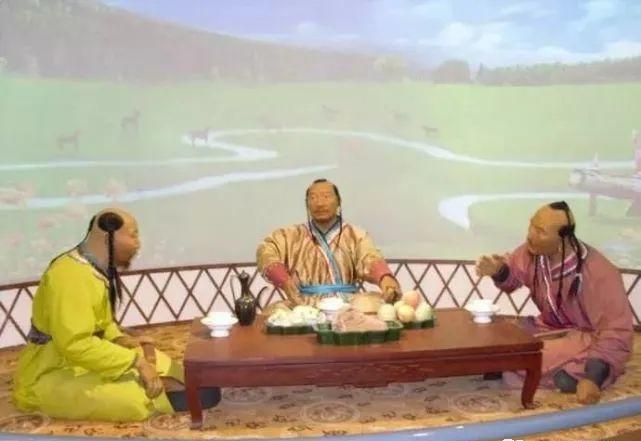
The fourth floor of the city is open to the east,
The kings of Zhengdan came to the face.
Dog roasted sheep milk wine,
The military regiment sat laughing and passed the cup.
This poem is from the famous Qing Dynasty scholar Zhao Shizhe's "Liao Gong Ci", which refers to the Khitan people's "Zhengdan", which is what we call the Spring Festival.
The "Zhengdan" of the Khitan people is recorded in the "Liao Shi Li zhi shi The word "Zhengdan" appeared in the Central Plains books relatively early, and it was an important festival that was highly valued by the whole Country of the Khitan Dynasty.
Translation of the poem: Whenever the New Year came, the gates of the fourth floor of the Khitan opened to the east, and the envoys of the various kingdoms came from all directions, killing dogs and sacrificing gods to roast the whole sheep and stir the milk wine, and the monarchs sat around and drank cups of joy. This poem was written by the Han poet of the Qing Dynasty, who obviously did not understand the customs of the northern ethnic groups, and also wrote about killing dogs, all ethnic groups in the north love dogs, dogs are human friends, so it is impossible to kill dogs, which is the imagination of this Qing Dynasty Han poet.
On this day, one of the most important activities was that the Khitan Emperor would accept the pilgrimage of the envoys of various countries. During the period of peace and friendship, the Liao and Song exchanged envoys to celebrate the New Year, and in addition to Emperor He, they also wanted to congratulate the Empress and Empress. For this purpose, the Song Dynasty set up a special messenger for the State of He Zhengdan, which was an official in charge of the He Zhengdan Festival on the National Day of foreign countries.
Every year on the first day of the first lunar month, we call it the Spring Festival, and the Khitan people call it "Zhengdan" or "Yuanzheng". On this day, the most important thing is that the Khitan Emperor will accept the pilgrimage. This custom was first seen in the second year after the liao taizu Yelü Abaoji ascended the throne, "the imperial hall was congratulated by hundreds of officials and envoys of various countries". The official edict jinhe was in the fourth year of Emperor Taizong's reign (941 CE). The Liao coexisted with the five dynasties and the Song dynasty, and the festivals on both sides were the same, and in the non-belligerent years of peace, every year on the first day of the new year, both sides sent envoys to each other to celebrate the New Year. In addition to Emperor He, empress dowager and empress dowager. According to the "Liao Shi Lizhi Zhengdan Pilgrimage Ceremony", the core of the ceremony is "prayer", and the prince of light has to perform 4 rituals, each time about 5 prayers, which is a very sinful thing for the prince. This also understands what Han Qi said in the "Anyang Collection makes the play into a poem", "the etiquette is partial to bitter Yuan Zheng worship".
According to the "Continuation of the Zizhi Tongjian Song Jijiu", "Ordered the inspector Yushi Li Bin and the Gate of The Gate to wait for Zheng Wei to be the envoys of the Khitan Zhengdan." Song Litao's "Continuation of the Zizhi Tongjian Commander Compilation , Zhenzong Dazhongxiang Fu First Year September Jiashen" records: "With Yushi Ma Liang as the envoy of the Khitan mother Zhengdan, and the Xijing workshop as Wei Zhaoyi's deputy; The official Wailang Sun Yi (孙奭) was the envoy of the Khitan lord Zhengdan, and he was the deputy of Xue Yikuo (薛贻廓). ”
According to the "LiaoShi Lizhi Zhengdan Pilgrimage Ceremony", the core content of the Zhengdan ceremony is "worship". This activity is very hard, so He Liao Zhengdan made Han Qi say in the "Anyang Collection to Make Hui Drama into Poetry", "Etiquette is more bitter than yuan zheng worship, and Hu Da Ju is light and eternal life".
The Khitans also had an important religious activity during the Spring Festival. The Liao Shi Li Zhi records that "on Zhengdan, the national custom is to take glutinous rice and white sheep marrow as a cake, and the pills are like fists, and each account is given forty-nine pieces." On the night of the fifth day, each throws a pill in the window inside the tent and throws it outside. Counting, moving, drinking. Counting oddities, two people in Wu Ten rang the bell, carried arrows, sang around the tent, exploded in the salt mound of the tent, burned the ground and slapped the rats, called the frightened ghost, and lived in the seventh day. Chinese is called 'nai pinch'. 'Is', Masaya; 'Pinch', Danya. ”
That is to say, the Khitans wanted to make fist-sized rice balls with glutinous rice mixed with white sheep marrow on the day of Zhengdan, and each felt tent put 49 pieces. On the fifth day, the people in each tent will throw the rice balls out of it at will, not necessarily all of them. After dawn, check the number of rice balls outside the tent, and if they have an even number, they will play music and hold a banquet; if they have an odd number, they will order 12 shamans (wizards) to ring bells with arrows and sing around the tent, and inside the tent they will burst salt in the furnace and burn the ground to shoot rats, called "frightened ghosts" . Since then, you have to stay in the account for 7 days before you can go out.
It is learned from the above that Zhengdan is a seasonal festival of the Khitan people. The Khitans not only celebrated the Spring Festival but also lived so grandly.
Manchu Culture Network